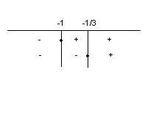[math]3/(2x)+(1/x-1)/(2+1/x)=(3-6/x)/(4x+2)+(3x+1)/(2x)[/math]
Per prima cosa semplifichiamo le fraizoni trovando il m.c.m. al numeratore e al denominatore:
[math]3/(2x)+((1-x)/x)/((2x+1)/x)=((3x-6)/x)/(4x+2)+(3x+1)/(2x)[/math]
Ora dividiamo il numeratore per il denominatore:
[math]3/(2x)+((1-x)/x):((2x+1)/x)=((3x-6)/x):(4x+2)+(3x+1)/(2x)[/math]
[math]3/(2x)+((1-x)/x) \cdot (x/(2x+1))=((3x-6)/x) \cdot 1/(4x+2)+(3x+1)/(2x)[/math]
A questo punto scriviamo le condizioni di accettabilità : affinchè l'equazione abbia significato deve essere
[math]x!=-1/2 ^^ x!=0[/math]
, poi svolgiamo le moltiplicazioni:
[math]3/(2x)+(1-x)/(2x+1)=(3x-6)/(x(4x+2))+(3x+1)/(2x)[/math]
[math]3/(2x)+(1-x)/(2x+1)=(3x-6)/(2x(2x+1))+(3x+1)/(2x)[/math]
Il m.c.m. è
[math]2x(2x+1)[/math]
, quindi:
[math](3(2x+1)+2x(1-x))/(2x(2x+1))=(3x-6+(3x+1)(2x+1))/(2x(2x+1))[/math]
[math]6x+3+2x-2x^2=3x-6+6x^2+3x+2x+1[/math]
Trasportiamo tutto al primo membro e addizioniamo:
[math]6x+3+2x-2x^2-3x+6-6x^2-3x-2x-1=0[/math]
[math]-8x^2+8=0[/math]
Moltiplichiamo entrambi i membri per -1:
[math]-1 \cdot (-8x^2+8)=-1 \cdot 0[/math]
[math]8x^2-8=0[/math]
Raccogliamo 8 e applichiamo la legge d'annullamento del prodotto:
[math]8(x^2-1)=0[/math]
[math]8=0 \nexists x in RR[/math]
[math]x^2-1=0 \\Rightarrow x^2=1 \\Rightarrow x=\\pm1[/math]







 Accedi a tutti gli appunti
Accedi a tutti gli appunti
 Tutor AI: studia meglio e in meno tempo
Tutor AI: studia meglio e in meno tempo